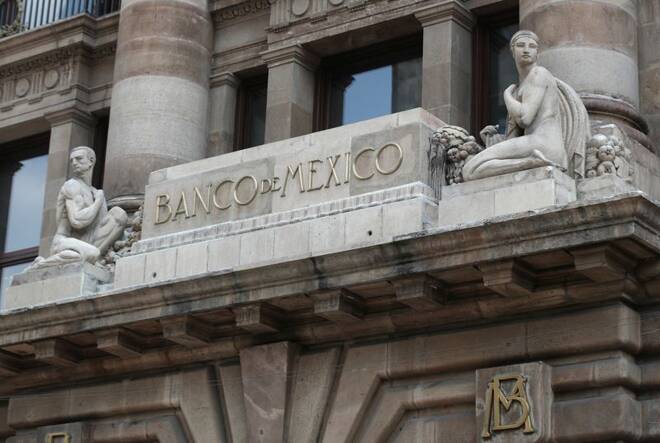Advertisement
Advertisement
Mexican central bank poised for lower rate hike
By:
MEXICO CITY (Reuters) - Most of the Bank of Mexico's board members consider its benchmark interest rate could be increased more moderately at the next monetary policy meeting, minutes of the central bank's latest meeting showed on Thursday.
MEXICO CITY (Reuters) -Most of the Bank of Mexico’s board members consider its benchmark interest rate could be increased more moderately at the next monetary policy meeting scheduled for March 30, minutes of the central bank’s latest meeting showed on Thursday.
Two weeks ago, the five-member board unanimously voted to raise the key rate by 50 basis points to 11.00%, beating expectations for a 25 point hike, citing a tricky outlook and suggesting future hikes would be smaller.
“Most members of the board consider that, given the monetary policy stance already attained and depending on the evolution of incoming data, for the next policy meeting, the upward adjustment to the reference rate could be of lower magnitude,” the minutes of the latest meeting showed.
Still, Irene Espinosa, the longest-serving board member, issued a dissenting opinion, saying the bank’s forward guidance needed to indicate the task of bringing inflation down to its target rate continues.
“And, thus, limiting the next decision by referring to a policy rate adjustment of lower magnitude implies a high and costly risk of correction if the assumptions do not materialize,” she said.
Banxico, as the bank is known, has carried out ten straight hikes of between 50 and 75 basis points since late 2021.
In total, the central bank has raised its benchmark interest rate by 700 basis points during the current hiking cycle, which began in June 2021, as inflation surged past its target of 3%, plus or minus 1 percentage point.
Deputy governor Jonathan Heath told Reuters last week the bank’s tightening cycle is nearing its end and nominal interest rates could top out at between 11.25% and 11.75%, at which point rates would be kept steady to allow them to take effect.
In the minutes, board members underscored their concern over core inflation, which strips out some volatile food and energy prices, even as headline inflation has eased.
“Most members pointed out that core inflation, which reflects inflation’s trend more accurately, still does not show a downward trend. In this context, they mentioned that the inflationary environment remains complex and uncertain,” they said.
All five board members expressed concern that core inflation was more persistent than expected.
The latest inflation data, released on Thursday, showed a slight easing, with annual core inflation down to 8.38% in the first half of February from 8.46% in the second half of January.
(Reporting by Anthony Esposito and Dave Graham; Additional reporting by Natalia Siniawski; editing by Barbara Lewis)
About the Author
Reuterscontributor
Reuters, the news and media division of Thomson Reuters, is the world’s largest international multimedia news provider reaching more than one billion people every day. Reuters provides trusted business, financial, national, and international news to professionals via Thomson Reuters desktops, the world's media organizations, and directly to consumers at Reuters.com and via Reuters TV. Learn more about Thomson Reuters products:
Did you find this article useful?
Latest news and analysis
Advertisement
